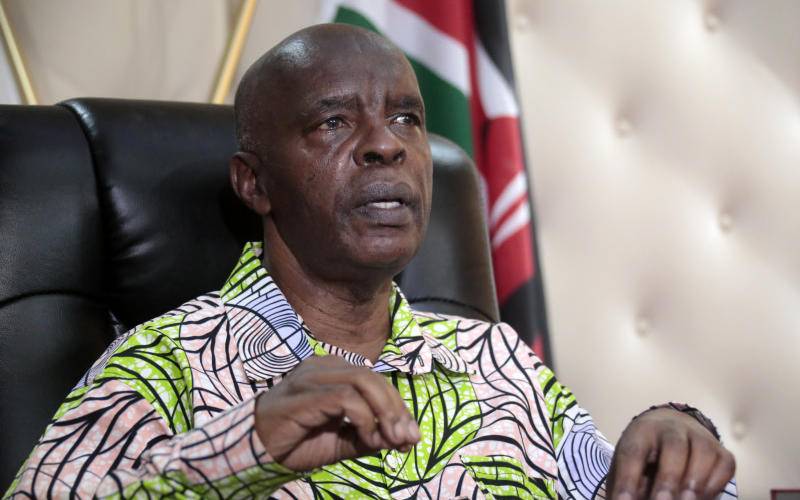Company CEOs and parastatal heads who have been unlucky enough to find themselves on the opposite end of Cyprian Nyakundi have a tale or two to tell about the blogger. The self-made digital journalist with a huge following social has a nose for scandal – and when he finds one, he can be unforgiving.
His specialization on exposing scandals and scams in corporate suits and high government offices has earned him the negative tag of being a gun for hire by those seeking to pull punches. Nyakundi, ever so unfazed, publishes scandal upon scam on prominent people, with some being forced to spend lots of cash to have the posts pulled down. Given that most of his scandals border on the defamatory, he has on a number of occasions been sued or slapped with court injunctions.
Nyakundi, who remains a mysterious figure to many online audiences, describes himself as “two-time award-winning blogger and political commentator who has an interest in all things controversial”. He has never shied from naming and shaming top politicians, celebrities and media personalities through his blogs and Social media forums.
He has in the past exposed top secretes in the corporate world of Kenyan companies and CEOs. Companies he has scratched include Safaricom and BIDCO Africa their CEOs, then Bob Collymore, and Vimal Shah, respectively. This has made him an occasional guest of security and law enforcement offices and earned him nights in police cells.
Yet, on a positive side, the likes of Nyakundi have offered a much-needed medium to expose information that mainstream media would shy from publishing for fear of litigation or biting a hand that feeds them.
Allure of scandalous news
Indeed, scandal sells in Kenyan media, or rather it attracts more readership or viewership. To understand how Nyakundi, and other bloggers like him operate, you need to look at the two sides of a scandal.
First, the scandal and the perpetrator, often a person in high office. Then, on the other hand, there’s so-called whistle blower, who is almost always someone with personal interest either in the office or scandal. Apparently if the stakes are high, the whistleblower will pay a blogger to expose the scandal.
In other cases, low cadre whistleblowers usually team up with a blogger to use the scandal to make some cash through extortion. The scandal subject, fearing bad press, pays up and the article will not be published. And the whistleblower will move to a different blogger. The scheme repeats itself like that until the scandal subject either gives up or resorts to legal means.
See Also >> Inside News Anchor Trevor Ombija’s Multi-Million Business Empire
Another way is publishing the scandal details to scare the person being accused who then will seek to pull down the content by paying up, often a high price than killing the article before it is published.
In cases where the whistle-blower pays for the scandal to be exposed, it turns into a higher-bidder contest as the publisher bargains with either side. Whoever pays more carries the day. At the end, good money has exchanged hands – and a scandal exposed nonetheless.
The push to pulldown articles is a PR tact to clean the internet of any evidence of the scandal. Keeping it live would work against the subject in his current and future engagement in a world where the internet has become the number one reference point.
It remains a lucrative enterprise which even the Media Council of Kenya has been unable to control.
Kenya has enough supply of scandal journalism in the blogosphere and even mainstream media houses. Some bloggers and mainstream journalists have been busted in the game, while others have their way.
The scandal-peddling industry just never dies – it remains a lucrative enterprise which even the Media Council of Kenya has been unable to control and it often finds itself a victim. It is a grey area that has only a small fraction of journalism in it.

The latest Nyakundi spat involves Mwananchi Credit Ltd CEO Dennis Mombo, who has come up against the blogger. Mr Mombo says Nyakundi has over the years authored defamatory articles against him and his company, Mwananchi Credit.
“I believe in giving people second chances,” Mr Mombo says. “The first time he wrote something negative about me, and I reached out to him and we became friends.”
But the friendship appears to have been temporary. “Well, this has come to an end. I am a businessman. I don’t want fights. Fights are expensive but this boy is now pushing me to the wall and I will fight back to protect my reputation and my company’s name,” says Mr Mombo.
Running afoul the law
He reveals Nyakundi has ignored a court order barring him and any of his associates from publishing anything about Mr Mombo or Mwananchi Credit. “Kenya is governed by laws and we will use the legal way to deal with him. He is in the first place, disobeying a court order, and that’s where we will start,” states Mr Mombo saying he will go back to court.
In January this year, Kenya Tea Development Agency (KTDA) and its CEO Wilson Muthaura threatened to sue blogger Cyprian Nyakundi for defamation over Facebook posts and a blog insinuating sexual harassment being tolerated in the company.
In a demand notice to the blogger dated 9th January, 2023, J.K. Kibicho & Company Advocates, acting on KTDA’s behalf, gave the blogger 12 hours to retract said articles from his website and issue an apology.
The tea agency claimed that Nyakundi defamed the company and its CEO in a series of posts that allege a female employee had been sexually harassed by Muthaura and that the CEO would disregard court orders.
See >> James Mwangi Reveals Mama’s Secrets That Drive Equity Bank
Last year Cyprian Nyakundi and his associate Emmanuel Nwamweya Ong’era were charged with an extortion attempt, involving Ksh17.5 million from Victoria Bank. They denied the charges and were granted a cash bail Ksh300,000 each.
Nyakundi and Ongera denied that they received Ksh1 million from Victoria Commercial Bank CEO as down payment of Ksh17.5 million as pre-condition for pulling down several libellous articles they posted on their blog on diverse dates between 10th September 2019 and 15th January 2022.
Last year, former Makueni Governor Kivutha Kibwana also sued blogger Cyprian Nyakundi for defamation and extortion. Nyakundi had demanded Ksh10 million to pull down a defamatory article against the governor.

Kibwana served the blogger through an advert appearing on Kenyan mainstream daily newspapers through Nyamu & Nyamu Company Advocates. The civil suit, number 234 of 2021, has been filed at the Kenyan High Court with the advert stating that Nyakundi has been restrained from further publishing any content deemed defamatory to the plaintiff.
Nyakundi started his digital exploits in 2012 while studying at Meru University, where he was suspended for a year for sharing internal information on Twitter. There is no record to show that he went back to clear his studies.
See >> It’s Complicated – Media And PR Try To Find Working Relationship
Kenyans on Twitter came to his defence, pushing him to prominence online. He then started a WordPress free hosted blog in early 2014 but later registered a custom domain cnyakundi.com.
Some personalities who have sued Cyprian Nyakundi for exposing certain information about them:
- He has been sued for defamation by Prof. Kibutha Kibwana. Kivutha was not happy with a published article on Nyakundi’s blog that touched on his lifestyle.
- Fred Matiang’i also sued him in 2018 for publishing offensive information.
- Safaricom also sued him in 2015 for defaming the telecommunication company by posting baseless and unsubstantial information.
- After the Safaricom suit, he was also sued by Bidco and National Bank of Kenya.
- In 2018, Mike Sonko and Anne Waiguru moved to court to sue him for allegedly writing derogatory statements against them.













Leave a comment